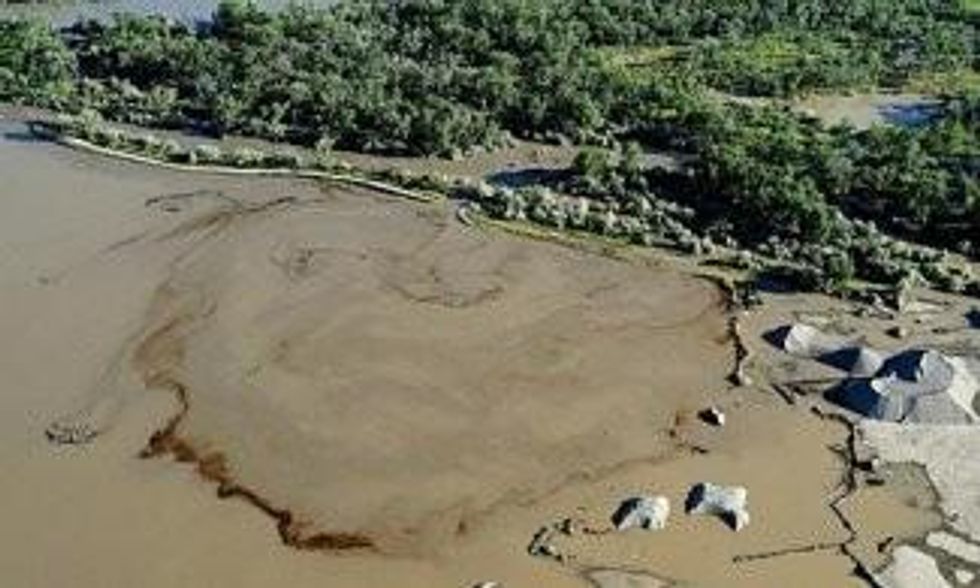Another climate-related record will soon be broken, but it's not like those you've been hearing about: the heat waves, droughts and torrential floods setting calamitous precedents everywhere. For a change, mark down this next one as a sign of hope. It's that Washington will play host to the largest act of civil disobedience for the climate in US history.
From 20 August to 3 September, a wildly diverse range of protesters - Nebraskan ranchers and teachers from Wisconsin, Texan landowners and indigenous leaders in Canada, some of the country's top scientists and a few celebrities - will descend on the White House for a series of enormous sit-ins. Their demand: that President Obama deny a permit for a pipeline that would further hook the United States to the Albertan tar sands, the world's dirtiest oil.
TransCanada's 1,700-mile Keystone XL pipeline will carry as many as 1.1m barrels of crude a day to the Gulf of Mexico. It will cut through the sensitive heartland of the country. It will massively enrich big corporations. And it is certain to spill: the only question is when and how often and with what kind of human and environmental toll.
If that were not enough, the pipeline is also a surefire recipe to overcook the planet. World-renowned climate scientist James Hansen has concluded only drastic measures will prevent a catastrophic rise in temperature: phasing out coal over the next 20 years, and immediately ending the use of unconventional fossil fuels like tar sands. Burn the murky and gigantic pool of Canadian carbon, and it is "essentially game over" for the climate. The decision for the pipeline's go-ahead ultimately and fortuitously rests with Obama alone - and thus, so too the power to begin rewriting this ecological horror story. Organisers are hoping persuasion with their bodies will help: already, 1,500 have signed on to risk arrest.
They are up against a Canadian government that has become the foreign branch of the tar sands industry. It is scrambling to beat back the resistance - what officials describe in internal documents as a "ferocious attack by the US environmental movement". TransCanada has hired George Bush's former ambassador to Canada as a lobbyist, alongside Secretary of State Clinton's former deputy campaign director. Last week, Canada's foreign and natural resource ministers were dispatched to Washington to remind Clinton of their service to US "energy security" - the idea that the US can safely suck Canada's oil, instead of unfriendly Venezuela's or the unstable Middle East's.
This key message of Canada's global PR strategy aims to distract from the path to genuine energy security: that we speedily get off dirty crude and, eventually, oil itself, and get into renewables. Secret British memos have revealed that the Canadian government is "acutely aware" that "CO2-intensive oil sands exports might become less desirable to the US in the future." Canada knows European governments, which are trying to slap an unwanted label on the tar sands, have seen through their smoke and mirrors; they are worried the US may follow suit.
Stopping the Keystone XL's construction would be an emboldening victory. Alberta's energy minister, Ron Liepert, has confessed his anxieties about the non-violent resistance encircling the oil patch:
"If there was something that kept me up at night, it would be the fear that before too long, we're going to be landlocked in bitumen."
Pipelines are the central nervous system of the infrastructure of fossil fuel pollution. Cut the service points one by one, and you disable the destruction: keeping the oil in the soil, the coal in the hole and the tar in the sands.
But oil companies won't easily abandon the lucrative promise of perpetual fossil fuel addiction. And in a Washington dominated by the corporate class (among whom there is no shortage of climate change deniers), lobbying for strong climate legislation has proved an abysmal failure.
Hence the shift in strategy. It appears the Obama administration will only act like there's no Planet B if we mount a Project C - a plan for full-scale confrontation, along the lines of the civil rights movement's historic blueprint for action in Birmingham, Alabama. The potency of direct action is not that it will physically stop pipeline construction, just as it didn't by itself make racism evaporate in the savagely segregated deep south of the fifties and sixties. It is that it may so provoke a crisis as to make the issue unavoidable by the media, and force the hand of the US government. It's about time people-power returned to America.
